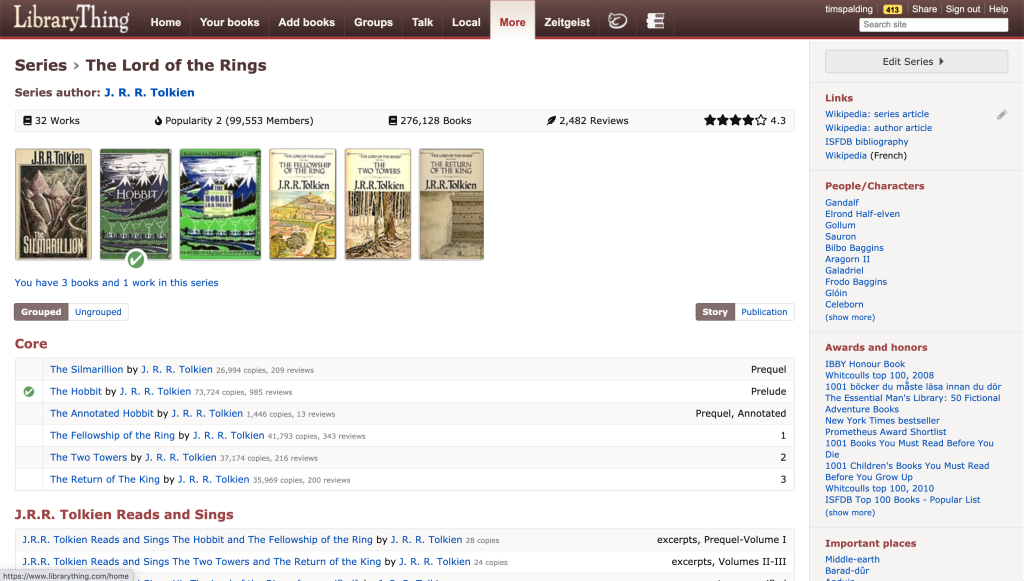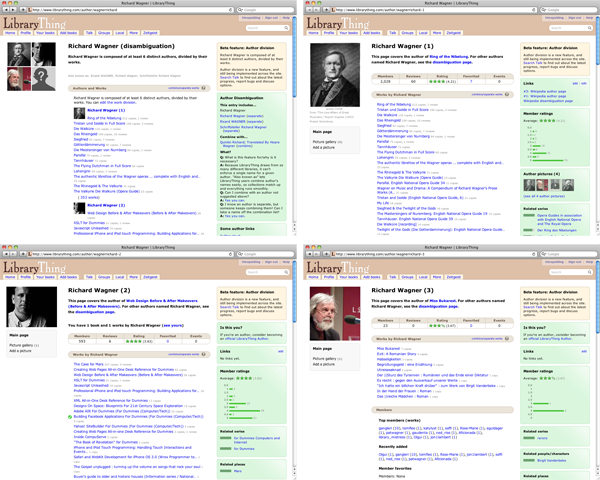Short Version
Today we roll out a new version of “Series” and “Publisher Series.” Here are some pages to check out:
- Series > Harry Potter
- Series > Bill Bryson’s Travels
- Your Books: Series
- Stats/Memes: Series in your Library
- Zeitgeist: Series
We’re going to be discussing New Series starting from this Talk post.
The rest of this blog post explains the whys and wherefores in great detail.
“Old” Series
Before today, series were based on the Common Knowledge system. Common Knowledge is a simple “fielded wiki,” a system for keeping and tracking simple values.(1) To add a series to a work, you’d go to the common area of a work page and fill it out as follows:
It got complex quickly. Here’s one Star Wars book, with stuff inside parentheses for sorting and labeling.
Needless to say, an entry like “Star Wars (0.0112994350|88.5-22 BBY)” was inaccessible to many. Nor could works be added to a series on the actual series page. Series didn’t extend well to other languages—unless the names coincided, there was endless duplication of effort. A lack of any sort of grouping or subseries gummed up major series with edge-cases, like the re-segmentation of the Lord of the Rings applicable to only some Japanese editions, and made it tricky for users to look at a series and figure out what to read. And while some information came to adhere to series, the whole system was jerry-rigged. Finally, adding NEW features was truly impossible!
It is testimony to the passion and diligence of LibraryThing members over the last 13 years that they have added some 125,000 “regular” series and 30,000 “publisher” series!
“New Series”
New series starts with a more sophisticated data structure and user interface. Series exist as their own, complex entity, like works and authors are, not as series of Common Knowledge “strings.” This means:
- Adding to series can be done on either work pages or series pages. (On work pages, series have been moved to the (renamed) “Series and work relationships” section.)
- Sorting works within series is accomplished by dragging and dropping, or by giving the series a default sort, such as by publication or title.
- Adding labels like “book one” can be done directly, not as part of a larger formula.
Series can now include “groups.” Every series has a “core” grouping, but can also include sections for omnibus editions, short stories, or anything else that—while useful—might be worthwhile to separate out. You can see this on the Lord of the Rings page.
The more sophisticated structure allows for other innovations:
- A single series can serve across all of LibraryThing’s languages, with different names in different languages.(2)
- Series can be combined and, in combining, the editor can choose which elements to bring over from one series to another.
- Series can now be “related” to each other, much as works can be related to works. For example, the Harry Potter Movies can be listed as an adaptation of the famous novels.
- Every series-related action is separately tracked for examination by members and staff—much like Common Knowledge but with all the extra detail available once single strings were abandoned.
“New Series” has also advanced LibraryThing’s “LT2” redesign project. In making the new pages, Chris Holland essentially worked out LT2 code and concepts, and applied them to a single page on “LT1.” He has learned a lot about how to recast LibraryThing pages without breaking everything.
Finally, series can now be touchstoned, just like authors and works! As works use single brackets, like [War and Peace], and authors use double-brackets, like [[J. K. Rowling]], series use three brackets like [[[Twilight Saga]]].
Future Plans
The near future will see:
- Members able to follow a series, and see and receive updates when new books are released in that series.
- “Publisher series” transformed by allowing these work-based lists to be narrowed down to the publishers and editions that pertain to them.
Can You Help?
Series needs your help! Old data needs cleaning up, and all sorts of new data needs adding.
- We need your help finding bugs and improving existing features so they are maximally intuitive and useful.
- We need help establishing best practices and norms for the new possibilities. For example, now that we have true series “relationships,” I favor removing adaptations from series and making them and their own series.
- The biggest data problem is a surfeit of non-English variants. The Common Knowledge structure hid them, but members using LibraryThings other language sites, like LibraryThing.fr (French) and cat.LibraryThing.com (Catalan), created an enormous number of series too—most of them the same as the English series. They need to be combined. For example, before I combined them, the Twilight Saga also existed as “Houkutus” (Finnish), “Saga ‘Zmierzch'” (Polish), and “Crepúsculo” (Spanish).
- The second biggest task is reviewing the “groups” within series. Omnibus editions and selections have been automatically assigned to a separate group with 95% accuracy, but other groupings have not been attempted.
- There is a “Needs Help” / “Looks Good” control within the Edit dropdown menu. You can use this to flag the series as needing help or give approval that the series is currently in good shape.
Check It Out
Here are some links to check out!
Here are some links of interest to people who want to dig deeper:
- Series > For Dummies — a very large series still in need of some work
- Publisher Series > Signet Classics — A publisher series. Because we do not yet have edition specification by publisher/ISBN, well, the covers irritate me!
- Change History page for Harry Potter
- “Global” Change History page — Simple, for now.
Footnotes:
1. For more on Common Knowledge see our 2007 blog post.
2. Separate series should only be maintained if there is a difference between the series so great that combining them would mislead. This is one of those things we’ll have to hash out as a community.


















 Introducing the
Introducing the 




